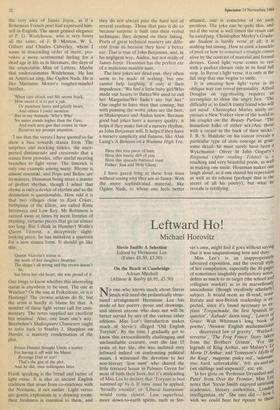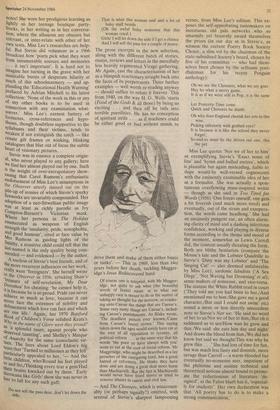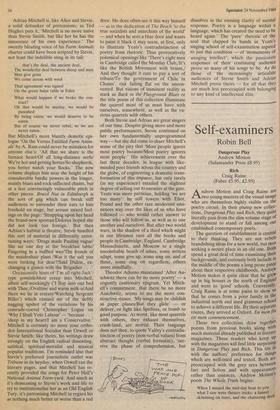Leftward Ho!
Michael Horovitz
Stevie Smith: A Selection Edited by Hermione Lee (Faber £8.50, £3.50) On the Beach at Cambridge Adrian Mitchell (Allison & Busby £6.95, £3.50)
No one who knows much about Stevie Smith will need the pedantically struc- tured arrangement Hermione Lee has made of her poetry, prose and drawings, and almost anyone who does not will be better served by any of the various other editions. Miss Lee's introduction makes much of Stevie's alleged 'Old English Toryism'. By the time I gradually got to know this extraordinarily challenging and unclassifiable creature, over the last 15 years of her life, she was inclined very leftward indeed on confronting political issues. I witnessed the devotion to her non-literary 'lion aunt' who shared the little terraced house in Palmers Green for most of both their lives, but it's misleading of Miss Lee to declare that 'Toryism is best summed up' by it. If 'isms' must be applied, 'broadly socialist' or 'Liberal humanism' would come closest. Less superficial, more down-to-earth spirits, such as Ste-
vie's own, might feel it goes without saying, that it was unquestioning love and duty.
Miss Lee's is an inappropriatelY laboured exposition, and the overall style of her compilation, especially the 30 pages of sometimes laughably perfunctory notes, defers as much to its target (the school and, collegiate market) as to its marvellouslY unacademic (though creatively scholarly.) subject. It would seem an ill-read, semi' literate and non-British readership is e7t- pected, since it's found necessary to ex- plain `Torquemada: the first Spanish in" quisitor', Aubade: dawn song', 'Leaves of Grass: Walt Whitman's long book of poems', 'Newton: English mathematician . . . discovered law of gravity', 'Warlock. sorcerer', 'The Frog Prince: Story taken from the Brothers Grimm', Tor the legends of King Arthur, see Malory's bee Morte D'Arthur, and Tennyson's Idylls 01 the King', 'magenta: pinky red', `adamar!" tine: hard, unbreakable', '6/6: six-and-0 (six shillings and sixpence)', etc, etc. In her gloss on 'Professor Dryasdust all Pater' from Over the Frontier, Miss Lee notes that 'Stevie Smith enjoyed satirising academics, literary authorities, Lond0n. intelligentsia, etc'. She sure did — hoW wish we could hear her riposte to these notes! She wore her prodigious learning as lightly as her teenage boutique party- frocks, in her writing as in her conversa- tion; where the allusions are obscure but relevant, or inter-relate with other of her own texts, Miss Lee's researches are help- ful But Stevie did volunteer in a 1966 broadcast how 'poets pick what they want from innumerable sources and memories • . it isn't important'. It is hard not to imagine her turning in the grave with her inimitable bursts of desperate hilarity at much of this schoolmarmery — and ap- plauding the 'Educational Health Warning' Prefaced by Adrian Mitchell to his latest collection: 'None of the work in this or any of my other books is to be used in connection with any examination what- soever.' Miss Lee's earnest battery of footnotes, cross-references and hypo- theses, though doubtless supportive to the Syllabuses and their victims, tends to weaken if not extinguish the torch — like ornate gilt frames or winking, blinking catalogues that blur out of focus the subtle heart of visionary pictures. Stevie was in essence a complete origin- al, who never played to any gallery; here we find her almost played out by one. Such is the weight of over-extrapolatory show- casing that Carol Rumens's enthusiastic endorsement of Miss Lee's assumptions in the Observer utterly missed out on the Pile-up of ironies of 'which Stevie's sparky fireworks are invariably compounded. Her adoption of a neo-Sitwellian public image was at least as richly parodic as Ivy Compton-Burnett's Victorian mask. Where her persona in The Holiday enumerated as weapons of English strength the 'insularity, pride, xenophobia, and good humour', cited at face value by Mrs Rumens as guiding lights of the Smithy, a sensitive child could tell that the last-named is the only quality being com- mended — and evidenced — by the author. A nucleus of Stevie's best friends, and of the more recurrent influences on her work, really were 'foreigners'. She herself wrote in the Observer in 1956, rebuking Shaw's' treasure of self-revelation, My Dear P?rothea' for cheating: 'he cannot help it, it is because he is so proud. Pride can never achieve so much as love, because it can never face the extremes of nobility and debasement which love can face and which are our life.' Again, her 1970 Batsford R. ook of Children's Verse relished Keats's Why in the name of Glory were they proud? a splendid taunt, against people who served taunting', and Shelley's Masque of Anarchy for the same iconoclastic vir- tues. The lines about Lord Eldon 's big tears that 'Turned to millstones as they fell' Particularly appealed to her, And the ttle children, who/Round his feet played tli o and fro ,/Thinking every tear a gem/Had their. brains knocked out by them.' Early S. tevieana like Girls! show she was never in line to fall for any such guff: Do not sell the pass dear, don't let down the side, That is what this woman said and a lot of .balsy stuff beside
(Oh the awful balsy nonsense that this woman cried.) Girls! I will let down the side if I get a chance And I will sell the pass for a couple of pence.
The prose excerpts in the new selection, along with the different batch of stories, essays, reviews and letters in the mercifully less heavily regimented Virago gathering, Me Again, cast the characterisation of her as a blimpish reactionary straight back into the faces of its perpetrators. Three further examples — well worth re-reading anyway — should suffice to refute it forever. This from 1940, on the way H. G. Wells 'starts (Food of the.Gods & all those) by being so exciting . . . and then off he tails into terrible puerilities. He has no conception of spiritual strife . . . as if machines could be either good or bad without minds to drive them and make of them either buses or tanks'. — This in 1969, less than two years before her death, tackling Mugger- idge's Jesus Rediscovered hard: Of course one is tempted, with Mr Mugger- idge, not quite to ask what (the beautiful words of Jesus) mean: as to what our unhappy race is meant to do in the matter of taking no thought for the morrow, or render- ing unto Caesar the things that are Caesar's. Some very nasty things are Caesar's, includ- ing Caesar's punishments. As Blake wrote, 'The deadliest poison ever known,/Came from Caesar's laurel crown.' This saying taken down the ages would surely have cut at the root of all opposition to tyranny, all political reform . . . in the same way that his words 'the poor ye have always with you' seem to cut at the root of social reform. Mr Muggeridge, who might be described as a lay preacher of the castigating kind, has a great hatred of reformers. He thinks they have done and are doing a great deal more harm than Machiavelli. But the fact is Machiavelli would never have freed slaves or tried to remove abuses in canon and civil law.
— And The Choosers, which is unaccount- ably (or perhaps signally?) omitted, with several of Stevie's sharpest lampooning verses, from Miss Lee's edition. This ex- poses the self-approbating tastemakers on incestuous old pals networks who so smarmily yet brazenly award themselves the prizes (in our day as in Stevie's, as witness the current Poetry Book Society Choice, a. slim vol by the chairman of the state-subsidised Society's board, chosen by five of his committee — who had them- selves been chosen by the selfsame poet- chairman for his recent Penguin anthology):
Oh we are the Choosers, what we say goes Hey ho what a merry game, It is as if we were still in Pop, it is the same Let Posterity-Time come Quick and Choosers be dumb.
Oh why does England cherish her arts in this wise, Picking inferiorly with grafted eyes?
It is because it is like the school they never forget, So-and-so must be the driven out one, this the pet.
Miss Lee quotes 'Nor we of her to him' as exemplifying Stevie's 'Exact sense of line' and 'hymn and ballad metres', which' is plausible but again misleading, liable to dupe would-be well-versed cognoscenti with the eminently examinable idea of her as a formalist. She was actually a spon- taneous overflowing muse-inspired writer — though as she said in Too Tired for Words (1956) 'One forces oneself, one gets a bit feverish (and much more tired) and eventually, out of the strain and exaspera- tion, the words came headlong.' She had an uncannily pungent ear, an often alarm- ing clarity of mind and a dashing infectious confidence, working and playing in diverse forms according to the theme and mood of the moment, somewhat as Lewis Carroll did, the content usually dictating the form. Both are blithe bestiarists (compare the Mouse's tale and the Lobster Quadrille to Stevie's 'Duty was my Lobster' and 'The Singing Cat' — also deemed unfaberable by Miss Lee); sardonic fabulists CA Sea Dirge', 'Not Waving but Drowning' et al); sense-makers of nonsense, and vice-versa. The stanzas the White Rabbit read in court (`They told me you had been to her,/And mentioned me to him:/She gave me a good character,/But said I could not swim' etc) sound a more or less directly antecedent note to Stevie's Nor we: 'He said no word. of her to us/Nor we of her to him,/But oh it. saddened us to see/How wan he grew and thin./We said: she eats him day and night/ And draws the blood from him,/We did not know but said we thought/This was why he grew thin. . .' She had lots of time for fun, but was much less fussy and donnish, more savage than Carroll — a warm-blooded but eventually no-nonsense seer, impatient of the philistine and asinine technical and theoretical notions almost bound to perme- ate the reductionism of literature 'de- signed', as the Faber blurb has it, 'especial- ly for students'. Her own declaration was that 'All poetry has to do is to make a strong communication.' Adrian Mitchell is, like Alice and Stevie, a solid debunker of pretensions; as Ted Hughes puts it, 'Mitchell is no more naive than Stevie Smith, but like her he has the innocence of his own experience.' The sweetly bleating voice of his Farm Animals charter could have been scripted by Stevie, not least the indelible sting in its tail: . . . that's the deal, the ancient deal,
The wonderful deal between sheep and men Men give grass We come across with wool That agreement was signed On the green baize table in Eden What would happen if we broke the con- tract?
Oh that would be mutiny, we would be punished By being eaten, we would deserve to be eaten.
But of course we never rebel, so we are never eaten.
But Mitchell's more bluntly demotic epi- logue 'On the Verses Entitled Farm Anim- als' by A. Ram could never be mistaken for anyone else's: 'All that we share is the furnace heart/Of all long-distance serfs/ We're hot and getting hotter/So shepherds, you better watch your flocks.' The new volume displays him near the height of his considerable bardic powers in the longer, mainly blues and rock-inflected chants, but at a less convincingly vulnerable pitch in other pieces. Brazil Nut in Edinburgh is the sort of gag which can break stiff audiences to surrender their ears to him freehold on stage, but arouse mixed feel- ings on the page: 'Strapping upon her head the brand-new sporran/Dolores hoped she did not look too foreign.' But then Adrian's habitat is theatre; Stevie handled this sort of material in differently enter- taining ways: 'Drugs made Pauline vague/ She sat one day at the breakfast table/ Fingering in a baffled way/The fronds of the maidenhair plant./Was it the salt you were looking for dear?/Said Dulcie, ex- changing a glance with the Brigadier . .
Occasionally hints of 'I'm all right-Jack'- type gemiitlichkeit creep into Mitchell, albeit self-mockingly (I flop into our bed with Thee,/Ovaltine and warm milk-o/And there we lie in ecstasy/Watching Sergeant Bilko') which remind me of the deftly nagging upshot of the variations by his comrade-coeval Christopher Logue on 'Why I Shall Vote Labour' — 'because, . . /deep in my heart/I am a Conservative.' Mitchell is certainly no more your ortho- dox International Socialist than Orwell or Stevie Smith; like theirs, his writings draw strongly on the English radical dissenting, satirical, spiritual-moralist and musical populist traditions. I'm reminded also that Stevie's preferred journalistic outlet was Tribune in its heyday, when Orwell ran the literary pages, and that Mitchell has re- cently provided the songs for Peter Hall's National Animal Farm-yard. And much as it's demeaning to Stevie's work and life to try to institutionalise her as an Old English Tory, it's patronising Mitchell to regard his as nothing much better or worse than a red door. He does often see it this way himself — as in the dedication of The Beach 'to the true socialists and anarchists of the world' — and when he sees a blue door and wants to paint it black it may seem, at first, only to illustrate Yeats's contradistinction of poetry from rhetoric. Thus provocatively polemical openings like 'There's eight men in Cambridge called the Monday Club,/It's like the British Movement with brains,/ And they thought it cute to pay a sort of tribute/To the government of Chile in Chains', risk falling flat on the uncon- verted. But visions of imminent reality as stark as Back in the Playground Blues or the title poem of this collection illuminate the quarrel most of us must have with ourselves, somewhere, as well as the va- rious quarrels with others.
Both Stevie and Adrian are great singers of our time. Despite giving more and more public performances, Stevie continued on her own fundamentally unprogrammed way — but she did come to share Mitchell's sense of the pity that 'Most people ignore most poetry because/Most poetry ignores most people.' His achievement over the last three decades, in league with like- minded poet friends across the country and the globe, of engineering a dramatic trans- formation of this impasse, has only rarely (in my experience) entailed the slightest degree of selling out to enemies at the gate. Yeats was more patrician, holding 'we are too many': he still towers with Eliot, Pound and the other rare modernist emi- nences way over the likes of us who have followed — who would rather answer to those who will follow us, as well as to one another and ourselves. But after two world wars, in the shadow of a third which might in our lifetimes raze all the books and people in Cambridge, England, Cambridge Massachusetts, and Moscow to a single uncombable beach of ashes, some writers adapt, some give up, some sing on; and of these, some sing on regardless, others more mindfully.
Theodor Adorn° maintained 'After Au- schwitz there can be no more poetry' — a cogently cautionary epigram. Yet Mitch- ell's commitment, that there be no more Auschwitz, seems to me the more con- structive stance. 'My songs may be childish as paper planes/But they glide' — or deliver, or fight like Spitfires, or bomb to good purpose. At worst, like most quarrels with others, they exhaust themselves, crash-land, are mortal. Their language does not then, to quote Valery's contradis- tinction of poetry (non-verbal values) from abstract thought (verbal formulae), 'sur- vive the phase of comprehension, but
dissolves in the ensuing clarity of mental response. Poetry is a language within a language, which has created the need to be heard again.' The 'pure' rhetoric of the soul that clapped its hands in Yeats's singing school of self-examination aspired to just this condition — of 'monuments of unaging intellect': which the passionate responses of their continuing audience prove so many of his songs to be. As do those of the increasingly articulate audiences of Stevie Smith and Adrian Mitchell prove theirs — for all that they are much less preoccupied with belonging to any kind of intellectual elite.
























































 Previous page
Previous page